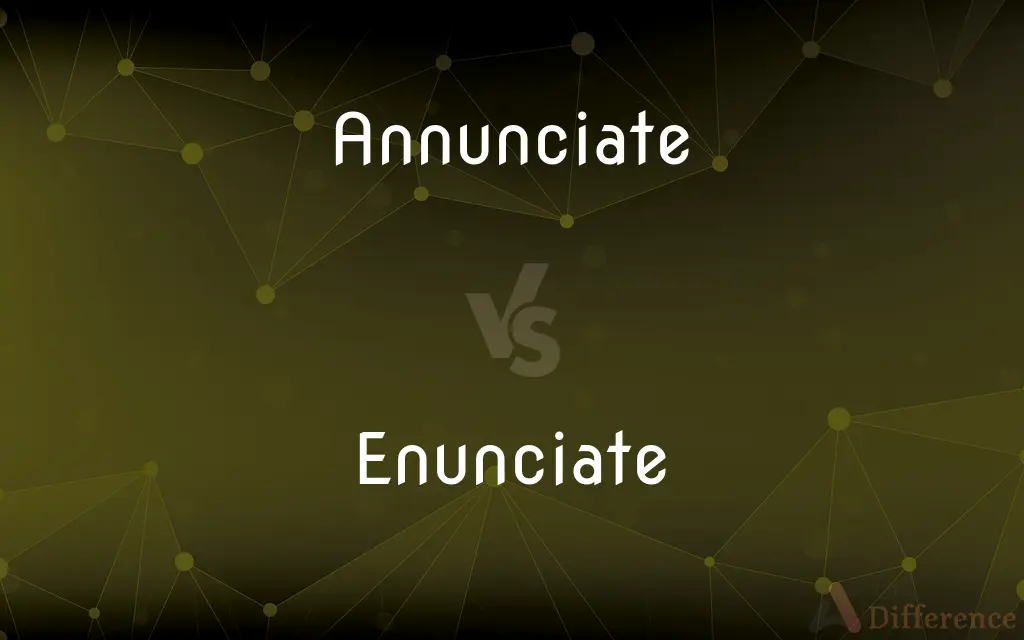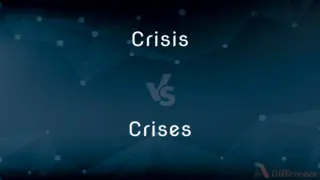Annunciate vs. Enunciate — What's the Difference?
Edited by Tayyaba Rehman — By Fiza Rafique — Updated on March 21, 2024
"Annunciate" refers to making an announcement, while "enunciate" means to pronounce words clearly.

Difference Between Annunciate and Enunciate
Table of Contents
ADVERTISEMENT
Key Differences
"Annunciate" is a verb that describes the act of announcing or proclaiming something, often used in formal or ceremonial contexts. This term is historically linked with significant announcements, such as those made in religious contexts (e.g., the Annunciation in Christianity, where the angel Gabriel announces to Mary that she will bear Jesus). On the other hand, "enunciate" is a verb that focuses on the clarity of speech. It means to pronounce words clearly and distinctly, ensuring that each sound and syllable can be easily understood.
"Annunciate" implies a formal declaration or making something known publicly. Enunciation is a critical skill in effective communication, as it helps prevent misunderstandings and ensures that the speaker's message is conveyed accurately. This term is often used in the context of public speaking, acting, and language education.
While "annunciate" deals with the content of what is being communicated, focusing on the act of making an announcement or proclamation, "enunciate" deals with the manner of speaking, emphasizing the clarity and precision of pronunciation. The distinction between these two verbs is essential for understanding their appropriate contexts and uses.
Choosing between "annunciate" and "enunciate" depends on the intended meaning: making a formal announcement versus speaking clearly. Both play vital roles in communication, but they cater to different aspects of conveying information.
Comparison Chart
Definition
To announce or proclaim formally.
To pronounce words clearly and distinctly.
ADVERTISEMENT
Focus
The act of making an announcement.
The clarity of speech and pronunciation.
Usage Context
Formal declarations, religious proclamations.
Public speaking, language education, effective communication.
Importance
Conveys the act of making something known publicly.
Ensures that speech is understood clearly by others.
Example
"The church bell tolls to annunciate the beginning of the ceremony."
"She took lessons to enunciate her words more clearly during presentations."
Compare with Definitions
Annunciate
Used in more formal or ceremonial contexts.
The herald was tasked to annunciate the arrival of the dignitaries.
Enunciate
Focuses on the clarity and precision of speech.
Actors need to enunciate clearly so that the audience understands every word.
Annunciate
Concerned with the act of declaring information.
The manager will annunciate the new project plans at the meeting.
Enunciate
Essential for effective communication and public speaking.
Teachers encourage students to enunciate to improve their oral presentations.
Annunciate
Involves making formal or significant announcements.
The spokesperson was chosen to annunciate the company's new policy.
Enunciate
Ensures messages are conveyed accurately and understandably.
Emergency instructions must be enunciated clearly to ensure public safety.
Annunciate
Often associated with religious announcements.
Paintings of the Annunciation depict the angel Gabriel's message to Mary.
Enunciate
Clear enunciation helps avoid confusion.
In noisy environments, it's important to enunciate to be understood.
Annunciate
Implies a public or widespread proclamation.
The government used television broadcasts to annunciate the new laws.
Enunciate
Involves the distinct pronunciation of syllables and sounds.
Language coaches work on exercises to help non-native speakers enunciate better.
Annunciate
Announce (something).
Enunciate
Say or pronounce clearly
She enunciated each word slowly
Annunciate
To announce; proclaim
"They do not so properly affirm, as annunciate it" (Charles Lamb).
Enunciate
To pronounce; articulate.
Annunciate
To announce.
Enunciate
To state or set forth precisely or systematically
Enunciate a doctrine.
Annunciate
To announce.
Enunciate
To announce; proclaim.
Annunciate
Foretold; preannounced.
Enunciate
To pronounce words; speak aloud.
Annunciate
Foreshadow or presage
Enunciate
(transitive) To make a definite or systematic statement of.
Enunciate
To announce, proclaim.
Enunciate
(transitive) To articulate, pronounce.
You must enunciate all the syllables.
Enunciate
(intransitive) To make sounds clearly.
Enunciate when you speak.
Enunciate
To make a formal statement of; to announce; to proclaim; to declare, as a truth.
The terms in which he enunciates the great doctrines of the gospel.
Enunciate
To make distinctly audible; to utter articulately; to pronounce; as, to enunciate a word distinctly.
Enunciate
To utter words or syllables articulately.
Enunciate
Speak, pronounce, or utter in a certain way;
She pronounces French words in a funny way
I cannot say `zip wire'
Can the child sound out this complicated word?
Enunciate
Express or state clearly
Common Curiosities
Can technology "annunciate"?
Technically, technology can be used to annunciate messages, such as automated announcements in public transit systems.
What does "annunciate" mean?
"Annunciate" means to make a formal announcement or proclamation.
How does "enunciate" relate to speech?
"Enunciate" refers to the act of pronouncing words clearly and distinctly to ensure understanding.
Can "annunciate" and "enunciate" be used interchangeably?
No, they cannot be used interchangeably as they refer to different aspects of communication: announcing vs. speaking clearly.
What techniques can help someone enunciate better?
Techniques like tongue twisters, slow speech practice, and working with a speech therapist can improve enunciation.
Why is enunciation important in communication?
Enunciation is crucial for clear communication, helping to prevent misunderstandings and ensuring the speaker's message is accurately conveyed.
How is "enunciate" used in education?
Teachers and language instructors emphasize enunciation to help students speak more clearly and be understood in their spoken language.
What is an example of a situation where one might "annunciate"?
A company executive might annunciate a new strategic direction during a press conference.
Is "annunciate" commonly used in everyday language?
"Annunciate" is less common in casual conversation and more often found in formal or specific contexts, such as religious or ceremonial announcements.
How can improving enunciation benefit someone?
Improving enunciation can enhance one's ability to communicate effectively, particularly in public speaking or in learning a new language.
Share Your Discovery

Previous Comparison
Heya vs. Hiya
Next Comparison
Crisis vs. CrisesAuthor Spotlight
Written by
Fiza RafiqueFiza Rafique is a skilled content writer at AskDifference.com, where she meticulously refines and enhances written pieces. Drawing from her vast editorial expertise, Fiza ensures clarity, accuracy, and precision in every article. Passionate about language, she continually seeks to elevate the quality of content for readers worldwide.
Edited by
Tayyaba RehmanTayyaba Rehman is a distinguished writer, currently serving as a primary contributor to askdifference.com. As a researcher in semantics and etymology, Tayyaba's passion for the complexity of languages and their distinctions has found a perfect home on the platform. Tayyaba delves into the intricacies of language, distinguishing between commonly confused words and phrases, thereby providing clarity for readers worldwide.














































